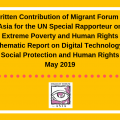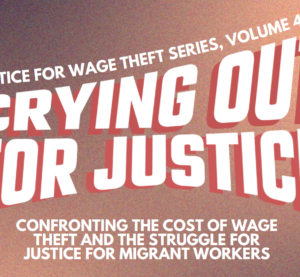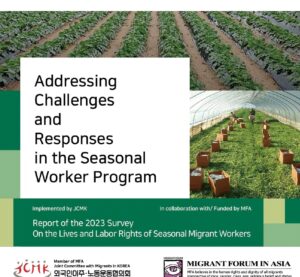Migrant Forum in Asia Statement to the 25th Session of the CMW
— November 22, 2016MFA Statement to the 25th Session of the CMW – International Convention on the Protection of the Rights of All Migrant Workers and Members of Their Families
As representatives of migrant organizations and NGOs, trade unions, women’s organizations, human rights organizations, individual activists, and a number of migrant workers, we wish to highlight the following points in relation to Sri Lanka’s periodic review by the Committee on Migrant Workers:
Migrant domestic workers.
Sri Lanka’s policies on women which aim to protect and prevent female migrant domestic workers from exploitation and abuse restrict and discriminate against women’s freedom of mobility. Such policies include the proposal approved in January 2011 to raise the minimum legal age of employment for female Sri Lankan migrant domestic workers from 18 to 21 as a means to lessen the probability of abuse and harassment abroad. There is also a Family Background Report (FBR) which came into existence to minimize any harm on the members of the families left behind, particularly children under the age of 5 thereby prohibiting the mother from travelling abroad for work. This requirement also includes securing a clearance from their husbands which we believe is a repressive action preventing women to decide on their own and work abroad. These policies do not address the compelling reasons that prompt women to migrate which at times include fleeing from domestic violence.
These restrictive policies lead to Sri Lankan women opting to go through irregular channels to be able to work and make a living abroad. There have been studies on other countries with similar policies that have clearly shown similar outcomes. Reports from members and partners of Migrant Forum in Asia (MFA) revealed that due to the pressing economic concern to make a living and provide resources for the family, women often times resort to irregular channels to bypass such restrictive policies despite, at times, knowing the risks of going through irregular channels. Furthermore, the restrictive policies introduced by the Sri Lankan government are unable to address the demand side of the issue where recruitment agencies are offering, upfront, 3 months-worth of salary to the spouse or household leader to send their spouse and even daughters to work abroad.
In relation to this, there is a tremendous need for effective pre-departure trainings for those wanting to work abroad most specifically in countries like Saudi Arabia that enforce the Kafala (sponsorship) system. Although the government is planning to extend the pre-departure trainings for potential migrant domestic workers from 21 days to 40 days, it is duly needed to ensure that trainers understand the issue on the ground and eminently inform potential migrant domestic workers about their basic human rights as well as protection and complaint mechanisms when in distress. MFA and its partners have persistently called for the contracts that migrant domestic workers sign to be in four languages including the two national languages of Sri Lanka—Singhalese and Tamil. Currently, it is only available in two languages (English and Arabic). MFA has also been insistently calling for a gender-sensitive contract that addresses the needs and interests of women in its engagement with the public and private sector.
During the 2nd Senior Officials’ Meeting of the Colombo Process (CP) in Colombo last 2014, Sri Lanka had been one of the initiators in discussing the standardization of employment contracts for migrant workers. As Chair of the CP, Sri Lankan government was, then, mandated to put this forward in the Abu Dhabi Dialogue. However, in the recently concluded CP meeting, the draft standard contract was no longer part of the agenda. Acting as a reference, the standardized contract could be used by activists and migrants when arguing for the content that should be present in a contract. The standardized employment contract could also serve as a tool for capacity building for migrant domestic workers by raising awareness of their rights as enshrined in ILO C189. During a training session, the standardized contract could be disseminated alongside a copy of the ILO Convention concerning Decent Work for Domestic Workers in a language familiar to the domestic workers. It is envisaged that countries of origin could use the model contract as a template during bilateral labour negotiations with destination countries or when writing nationally-based contracts. Sri Lanka can play a pivotal role in its leadership of the Colombo Process even as it hands over its chairmanship and takes on the chairmanship for the Abu Dhabi Dialogue.
Universal suffrage of migrant workers.
There have been efforts to conduct studies on absentee balloting systems in other countries and to propose a suitable system for Sri Lankan migrant workers but there have been no follow-up action on this despite the Minister of Foreign Employment stating how Sri Lankan migrant workers can possible have voting rights in the next 5 years. As recommended by the Special Rapporteur on the human rights of migrants on his report regarding the human rights of migrants in the post-2015 development agenda, economic growth is not an adequate measure of development and must also include civil and political rights to achieve peaceful societies, access to justice, and political participation. In addition, Migrant Forum in Asia has conducted a series of training in 2014-2015 with Sri Lankan civil society organizations in which one of the recommendations formulated was the migrant workers’ ability to exercise right to vote.
The Sri Lankan government has the duty to uphold their citizens’ entitlement, however, when outside the border, their entitlement which is integral to their being seems to be cut thus disempowers them of their rights. Given that more than 10% of Sri Lanka’s voting population are migrant workers, they should be empowered in such a way that they are able to participate in the democratic election of their country’s duty-bearers. In April 2016, A Parliament Select Committee (PSC) was appointed moved by Sunil Handunnetti to formulate a mechanism to enable Sri Lankan migrant workers to vote. The PSC’s task is to look into and provide reports on the difficulties faced by Sri Lankan migrant workers and the possibility of providing them the opportunity to exercise their right to vote. This process, however, needs to ensure that all stakeholders are substantively involved when looking into the challenges and recommendations on the suffrage migrant workers.
Sri Lankan migrant workers, deemed as Rata Viruwo meaning expatriate heroes or foreign employee heroes, contribute the most in Sri Lanka’s economic stability with their remittances. Not enacting and enabling the law that provides the possibility to participate merely reduces the labour of migrant workers being commodified through transmittal of remittances. It is high-time that their political participation is ensured and is substantively included.
Role of Missions in protecting and promoting the rights of Sri Lankan migrant workers and members of their families:
There is a wide gap between the Sri Lankan Mission and the Sri Lankan migrant worker community in all the destination countries. Specifically, there is no strong support from the Missions when migrant workers are put in a situation of exploitation, and other violations of human rights. Although there was a development of an operational manual with guidelines and procedures for the Labour Section of the Sri Lankan Diplomatic Missions, including trainings, this has not been effectively implemented. There should be training for Missions and they should have competence in terms of the use of the manual and corresponding financial and human resources to that mechanism which is sorely lacking. We recommend that the Sri Lankan government to do an audit of the operations of this mechanism.
More so, there is a non-existent system of registering Sri Lankan organizations, associations, or directory of focal persons who can address the distressed migrant workers which can be useful to be able to assist more migrant workers. In terms of complaint mechanisms of Sri Lankan migrant workers especially women migrant workers experiencing sexual violence, its procedures lack clarity and is not widely known by Sri Lankan migrant workers, hence, a need for a thorough pre-departure orientation/training.
In terms of transparency and accountability, Sri Lanka has launched a National Labour Migration Policy (NLMP) in 2008 however, with the absence of a published report on this, there seems to be no follow-up action on the implementation, monitoring, and evaluation of the policy and its impact since Sri Lanka’s Second Periodic Review. Also, the Sri Lanka Bureau of Foreign Employment (SLBFE) whose main mandate relates to migrant workers, does not have any representation from the migrant rights groups in its Board while recruiters are represented. This shows how there is lack of substantive and effective consultations and collaborations with civil society groups which are duly needed.
With the newly appointed Sri Lankan Ambassador to the Kingdom of Saudi Arabia, it is compulsory to know the modality or standard in which he was appointed given his background as a recruiter. There is a need to know what measures were taken to ensure that there will be no conflict of interest between expansion of labour market wherein the recruitment agency that the Ambassador was attached to has comparative advantage to others and the Missions’ responsibility to ensure the protection of Sri Lankan migrant workers.
Shrinking civil society space.
After the last elections, there has been significant shift in relations between civil society and government and this is well-acknowledged in different spaces for collaboration at different levels. However, MFA would like to bring to the attention of the Committee that MFA’s Regional Coordinator has been put on the watch list of the immigration authorities and was, hence, denied of visa to enter Sri Lanka to participate in 4th Senior Official meeting followed by the 5th Ministerial meeting of the Colombo Process upon the invitation of the Ministry of Foreign Affairs. Sri Lankan government needs to ensure that migrant human rights defenders are seen as integral in the policy-making and policy-review processes. They also need to ensure that civil society space has not shrunk and, therefore, would recommend that the names of the Regional Coordinator and other human rights defenders are taken off that list that was put together by the previous administration.




